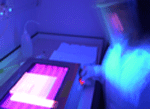
He has recently expanded his attack on Intelligent Design from a Christian perspective. His article is available here entitled "Is Intelligent Design Biblical?" and a shortened version of it is due to be published in the British Christian monthly "Evangelicals Now." I intend to produce a series of posts responding to his larger article.
In this post I want to examine Dr. Alexander's claim that ID is a revival of Deism and further that Michael Behe (and by implication those who embrace ID) is at least semi-Deistic in his teaching.

Here is his accusation:
It is in dissecting this argument that the semi-deism of Behe’s position may be perceived most clearly. The key give-away phrase is where Behe states that ‘Some features of the cell appear to be the result of simple natural processes, others probably so.’ Behe envisages a quasi-autonomous domain called ‘nature’ in which there are ‘naturalistic processes’ which science can explain, and a quite different domain in which the designer acts supernaturally to bring about designed processes which science is unable to explain.
Deism accepts a Real Creator and a real supernatural origin of matter, space, time and energy. At this point Deism is indistinguishable from classical Theism.
It is in its negative position that Deism is distinguished from Theism. Deism says (according to the OED) that having created the universe God does not intervene in it. God is the absentee landlord or the watch maker who wound up the watch and placed it carefully on the mantelpiece to carry on its unwinding. Thus deists reject the deity of Christ, the historicity of miracles and the whole concept of the special revelation of the scriptures. Thus Deism is actually serious and ugly heresy.
Alexander’s accusation of semi-deism is not focused on the traditional divergences of Deism from Christianity but on the understanding of divine providence or God's sovreignty over all creation and what we call natural laws and forces. Theism asserts that the laws of nature are laws and that they are regular because of the personal faithfulness and reliability of God and that the realm of natural law is under the sovereignty of the Word of God. The reign of natural law is the way God normally governs the universe but a Christian Theist claims that God has acted and will act above and beyond natural law.
Alexander’s accusation is therefore a claim that in stating that a class of natural phenomena exhibit ID we are also necessarily claiming that natural phenomena outside this class have escaped from the sovereignty of God’s Word. We have created a “semi-autonomous domain called ‘nature’ in which there are ‘naturalistic processes’ which science can explain.” However it seems to me that there is no evidence from the quote that Alexander uses of Behe that his understanding of natural law is any different from Alexander’s. Proposing a class of natural phenomena that exhibit ID is entirely independent of our convictions regarding God’s sovereignty over natural laws.
Alexander’s charge of heresy is founded upon wholly inadequate evidence. To distinguish three classes of features in a cell under the headings “natural, probably natural and designed” does not provide grounds for the accusation that the natural or even the probably natural have thereby escaped into an autonomous or semi-autonomous domain outside of the sovereignty of God. Saying we can reliably detect instances of ID in nature says nothing about our convictions about the sovereignty of God and natural laws.
To make a serious accusation such as the one Alexander makes here in print and in public is a solemn business and one which ought not to be made carelessly or lightly. If he is justified in his accusation then it is right to ask him to come forward with further evidence. If he has no further evidence then he has a duty to publically retract his accusation and admit that he was mistaken.
(William Dembski has a couple of posts on the background to this argument linked from here. Peter Williams has another background article here -"Paper on Theistic Evolution & ID published by Bethinking.org")
No comments:
Post a Comment